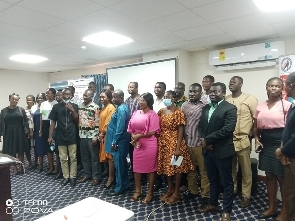 Stakeholders and attendees in a photo
Stakeholders and attendees in a photo
Deaf people with psychosocial disorders are facing a slew of human rights violations in Ghana as a result of their multiple conditions, according to a study by the Ghana National Association of the Deaf (GNAD). The GNAD study from May 2022 also found that deaf people with mental illnesses were often exploited by their employers, mistreated by co-workers, and forced out of their rented homes but was unable to complain because of communication barriers. Dr. Wisdom Kwadwo Mprah, a senior lecturer at the Kwame Nkrumah University of Science and Technology, presented the findings of the study that was conducted to assess the knowledge of and barriers to mental health services among deaf people in Ghana. "Family members deny deaf people with mental health conditions food and shelter and abandon them at prayer camps," the study said. It also discovered that while healthcare workers unnecessarily delayed attending to patients or refused to provide care due to a communication barrier, spouses divorced due to perceived difficulties. The study also found that deaf people with mental health issues had little or no knowledge of these conditions and were dissatisfied with the information they had been given about mental health by various sources, including medical facilities and officials. The caregivers appeared to have given up on treatments like medication and rehabilitation, as evidenced by the fact that they were giving their patients less of their time and money. Despite these difficulties, the psychosocial disorders that affect deaf people remain, and their associated consequences have received little attention. Dr. Mprah outlined some recommendations, including the need to improve mental health literacy among Ghana's deaf population and the creation of signs for mental health terminologies. According to him, this will help deaf and sign language interpreters get ready for a program on mental health literacy. He further stated that terminology for mental health issues should be developed and disseminated through social media using Ghanaian sign language. Deaf people's communication needs should be taken seriously because they can experience psychological problems and have a harder time getting the care they need if they have trouble communicating with the hearing world. Health centers should prioritize helping deaf people with their communication problems, and caregivers should receive training on how to assist deaf people with mental health issues. Mr. Mathew Kubachua, the national president of GNAD, stated that in 2021, with the assistance of Ghana Somubi Dwumadie [Ghana participation programme], the association initiated a project titled "empowering deaf people for improved mental health" in response to the mental health problems experienced by members. It is a four-year disability programme with a special emphasis on mental health, funded by UKaid, and managed by a team led by Options that consists of BasicNeeds Ghana, Kings College London, Sightsavers International, and Tropical Health.
Deaf people with psychosocial disorders are facing a slew of human rights violations in Ghana as a result of their multiple conditions, according to a study by the Ghana National Association of the Deaf (GNAD). The GNAD study from May 2022 also found that deaf people with mental illnesses were often exploited by their employers, mistreated by co-workers, and forced out of their rented homes but was unable to complain because of communication barriers. Dr. Wisdom Kwadwo Mprah, a senior lecturer at the Kwame Nkrumah University of Science and Technology, presented the findings of the study that was conducted to assess the knowledge of and barriers to mental health services among deaf people in Ghana. "Family members deny deaf people with mental health conditions food and shelter and abandon them at prayer camps," the study said. It also discovered that while healthcare workers unnecessarily delayed attending to patients or refused to provide care due to a communication barrier, spouses divorced due to perceived difficulties. The study also found that deaf people with mental health issues had little or no knowledge of these conditions and were dissatisfied with the information they had been given about mental health by various sources, including medical facilities and officials. The caregivers appeared to have given up on treatments like medication and rehabilitation, as evidenced by the fact that they were giving their patients less of their time and money. Despite these difficulties, the psychosocial disorders that affect deaf people remain, and their associated consequences have received little attention. Dr. Mprah outlined some recommendations, including the need to improve mental health literacy among Ghana's deaf population and the creation of signs for mental health terminologies. According to him, this will help deaf and sign language interpreters get ready for a program on mental health literacy. He further stated that terminology for mental health issues should be developed and disseminated through social media using Ghanaian sign language. Deaf people's communication needs should be taken seriously because they can experience psychological problems and have a harder time getting the care they need if they have trouble communicating with the hearing world. Health centers should prioritize helping deaf people with their communication problems, and caregivers should receive training on how to assist deaf people with mental health issues. Mr. Mathew Kubachua, the national president of GNAD, stated that in 2021, with the assistance of Ghana Somubi Dwumadie [Ghana participation programme], the association initiated a project titled "empowering deaf people for improved mental health" in response to the mental health problems experienced by members. It is a four-year disability programme with a special emphasis on mental health, funded by UKaid, and managed by a team led by Options that consists of BasicNeeds Ghana, Kings College London, Sightsavers International, and Tropical Health.